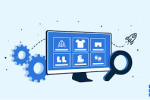Yes! Social media automation is a game-changer for e-commerce businesses. With the right tools, you can schedule posts, track engagement, and even run automated ad campaigns—saving time and boosting sales. 🚀
👉 Need expert help? Check out our Social Media Management Services!
Why Automate Social Media for E-Commerce?
Managing multiple platforms manually is time-consuming. Automation tools help you:
✔️ Post consistently across Instagram, Facebook, Twitter, and Pinterest
✔️ Engage with customers in real-time using AI-powered responses
✔️ Run targeted ad campaigns with data-driven insights
✔️ Monitor and analyze sales performance
Best Automation Tools for E-Commerce
1. Hootsuite – All-in-One Social Scheduler
📌 Best for: Managing multiple stores and platforms
💡 Features:
- Auto-schedules posts based on engagement trends
- Tracks performance and generates reports
- Manages customer interactions in one dashboard
2. Buffer – Simple Yet Effective Scheduling
📌 Best for: Small to medium e-commerce businesses
💡 Features:
- Easy scheduling and posting
- AI-powered hashtag recommendations
- Insights to optimize content strategy
3. Shopify + Later – Perfect for Product Promotions
📌 Best for: Shopify store owners
💡 Features:
- Direct product tagging in Instagram posts
- Auto-publishing to all major social media platforms
- Analytics to track sales driven by social media
👉 Want better SEO for your store? Check out our SEO Services!
How Automation Boosts E-Commerce Sales
✅ Automated Product Promotions – Schedule flash sales, product launches, and discount offers in advance.
✅ AI-Powered Chatbots – Answer customer queries 24/7 and recommend products instantly.
✅ Personalized Retargeting Ads – Re-engage visitors who abandoned their carts.
✅ Performance Tracking – Use analytics to improve future campaigns.
Common Mistakes to Avoid
🚫 Over-Automation – Don’t sound robotic; mix automation with real engagement.
🚫 Ignoring Analytics – Track your posts to see what works best.
🚫 One-Size-Fits-All Approach – Customize content for each platform.
👉 Need a high-converting e-commerce website? Check out our Website Development Services!
Final Thoughts
Automating social media for e-commerce saves time, increases engagement, and drives sales. The key is choosing the right tools and balancing automation with authentic interaction.
📌 Want to boost your e-commerce business? Contact Social Media Max today!

